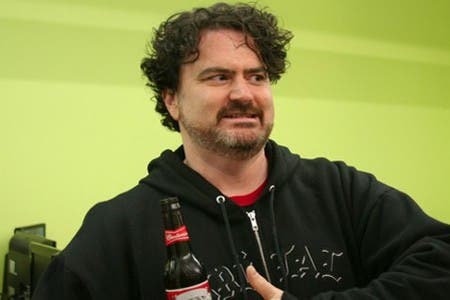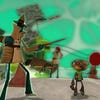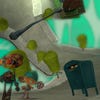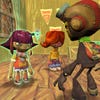Saturday Soapbox: Why Everyone Is Amazing
Devs and gamers are united, and there can be only one winner: everyone!
These are angry times. The interconnected world is plaiting the lunatic fringes into a sort of consistently annoying haircut (a skinhead, in this case), Argentina is hacked off because the United Kingdom has sent a piddly little nuclear destroyer to paddle around the Falklands, nobody seems to have any money but do enjoy that 1.5 per cent pay rise that doesn't come close to inflation, and - perhaps most importantly - the fine art of dubstep is being sullied by its unwelcome proliferation across supermarket aisles and game trailers.
It was in this spirit of apocalypse that Marsh Davies took to our weekly nutter-shouting-in-a-park Soapbox slot to argue that developers have the right to stay silent about their future plans. In the process, he annoyed an awful lot of you who didn't realise that his tone wasn't entirely serious, despite labelling the Facebook Like button an example of "ego-frotting evil". Oops!
But, in the midst of the debate, one of Marsh's central points went unnoticed: that there are some very healthy, legitimate reasons for gamers to feel entitled. Many games are evolving into a collaborative experience created by programmers and players, and while this can occasionally cause problems for both parties, we don't do enough to celebrate a gaming culture that is increasingly creative and participatory. As others have rightly argued, there is another way to look at the evidence of 12,000 people playing Half-Life 2 together in solidarity: "This is the generation where more people are more supportive of more things and they're more supportive in the most wonderful of ways."
"As others have rightly argued, there is another way to look at the evidence of 12,000 people playing Half-Life 2 together in solidarity: 'This is the generation where more people are more supportive of more things and they're more supportive in the most wonderful of ways.'"
(Oh, and if it makes anyone feel better, even Valve isn't usually this secretive and obtuse in the face of pronounced public opposition to something it's doing, so I'm taking its silence as confirmation that we'll see a Half-Life 3 announcement this year. Tell me I'm wrong, Gabe!)
12,000 people playing a seven-year-old game together on the same day in the forlorn hope it would draw the attention of their idols is one of a range of really good news stories about the games industry that probably doesn't always penetrate past the doom and gloom of stories like THQ sacking loads of staff or Sony closing a game studio weeks before its last release even hits the shelves.
There's actually a lot of good going on. The Humble Bundles raise millions for charity and support creative people who want to exist outside the traditional games industry structure; Tim Schafer gets to make a new adventure game (on a golden yacht at this rate); and while the UK Top 40 may make for grim reading now and then (especially if you get sent the private copyrighted sales data that goes with it), there is great prosperity among those who strive to innovate outside it. Did you know that Riot Games, the maker of League of Legends, is absolutely swimming in money? I didn't until recently. Good news though!
There are a few people sucking teeth, of course. THQ isn't doing very well - we all appreciated core games boss Danny Bilson's noble goal of empowering creative people to make the best-possible games, but the quality hasn't been there frequently enough to pay the bills - and even safe-sounding giants like Square Enix posted big losses in FY 2011. Meanwhile, Ubisoft seems to have lost some of the creative zeal that made every one of its mid-2000s games into an exciting, unknown quantity, resorting to annual iteration and spamming console launches, posting losses in the process.
Meanwhile, former Microsoft "XNA" man Chris Satchell's bold vision of an Xbox Live Marketplace dominated by a peer-reviewed community of high-quality indie developers has been thoroughly kicked to the kerb - as the company tries to get its ducks in order around a future entertainment vision that sees operating systems converging on smartphone, desktop, tablet and games console, and shoving high-margin premium video streams and downloadable content down your broadband pipe instead.
"The goldrush around the iTunes App Store will slow down and shake out quite a few losers, but this is nothing to fear. The best will survive."

But that's OK too, because people adapt. Change is healthy. As Tim Schafer himself told our friends at Hookshot Inc this week, "The indie community is now moving elsewhere. We're figuring out how to fund and distribute games ourselves, and we're getting more control over them. Those systems, as great as they are, they're still closed. You have to jump through a lot of hoops, even for important stuff like patching and supporting your game... I mean, it costs $40,000 to put up a patch - we can't afford that! Open systems like Steam, that allow us to set our own prices, that's where it's at, and doing it completely alone like Minecraft. That's where people are going." The goldrush around the iTunes App Store will slow down and shake out quite a few losers, but this is nothing to fear. The best will survive.
'The best will survive.' A few years ago you could have called me a hopeless optimist for saying that, but these days I think I'm right. Social media is replacing the search engine as a smart gamer's primary means of discovering good content, and social media is much better for sharing on the internet than search engines because it innately favours quality. People mostly share things that excite or fascinate them, partly because they want their friends and acquaintances to be excited and fascinated too, but mostly because they want to bask in the reflected glory of being the guy or girl who found that amazing new thing on the internet.
This sort of thing is going to make everything better, not just gaming, and it certainly makes a lot more sense than hoping Microsoft will stick a massive ad for your indie game on the Xbox dashboard when it can charge someone 40 grand for use of that space instead. Now you can just make what you do high quality instead, and - by notifying the best curators - you'll get the word out. It even works for websites. Removed from that nonsense and enshrined in the goodwill of Notch's half a million Twitter followers, I wouldn't be surprised if Tim Schafer's adventure game is a massive hit. As long as it's good, people will now have the means to notice.
Still these are angry times. It's hard not to find something in the news to cast a long shadow over your cornflakes every morning. Yet still gamers do amazing things to support amazing game developers, and around them the apparatus of a socially connected world seems hard-wired to start rewarding that sense of mutual support and optimism on a much grander scale. The good will out. The best will win.






























